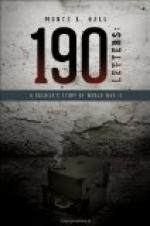His expression of this faith is always vague, tentative, and inconclusive. He is certain of something, but he cannot say what; yet he knows that he is certain, although, if he were to try to express his certainty in any old terms, he would reject it himself. He knows; but he cannot tell us or himself what he knows. There are sentences in which, as M. Chevrillon says, he speaks like an Indian sage; but I do not think that Indian philosophy would have satisfied him, because it is itself satisfied. For he is in this matter of faith a primitive, beginning to build a very small and humble temple out of the ruins of the past. He has no science of theology, nothing but emotions and values, and a trust in them. They are for a reality that he can scarcely express at all; and yet he is the more sure of its existence because of the torment through which he is passing. He uses that word torment more than once. The war is to him a martyrdom in which he bears witness to his love, not only for France, but also for that larger country which is the universe. The torment makes him more sure of it than ever before; it heightens his sense of values; and he knows that what matters to a man is not whether he is joyful or sorrowful, but the quality of his joy and his sorrow. There are times when, like an Indian sage, he thinks that all life is contemplation; but this thought is only the last refuge of the spirit against a material storm. He is not one of those who would go into the wilderness and lose themselves in the depths of abstract thought; he is a European, an artist, a lover, one for whom the visible world exists, and to whom the Christian doctrine of love is but the expression of his own experience. For a century or more our world, confident in its strength, its reason, its knowledge, has been undermining that doctrine with every possible heresy. In sheer wilfulness it has tried to empty life of all its values. It has made us ashamed of loving anything; for all love, it has told us, is illusion produced by the will to live, or the will to power, or some other figment of its own perverse thought. And now, as a result of that perversity, the storm breaks upon us when we seem to have stripped ourselves of all shelter against it. The doctrine of the struggle for life becomes a fact in this war; but,




